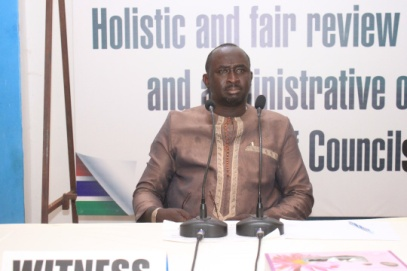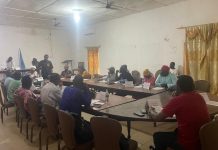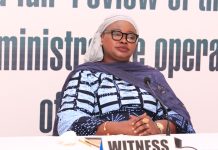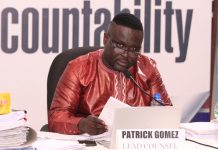For Revenue Collection
By Makutu Manneh
Bai GibbiSallah, former Finance Director of Mansakonko Area Council and current Chief Executive Officer (CEO) of Basse Area Council, has admitted that they were using private receipt books to collect revenue for Mansakonko Area Council’s conference centre.
Mr Sallah made this admission while testifying before the Local Government Commission of Inquiry on Wednesday.
“We printed private receipts for the conference centre and we opened an account at Supersonicz,” he said.
He said the account was meant to only receive deposits and no withdrawals as the conference center was set up as an income generating entity. He added that the general council sanctioned the decision and asked him to provide the receipt books.
Sallah revealed this when Counsel Gomez put him through the 2020 and 2021 Audit Report for Mansakonko Area Council which indicates that the Area Council procured privately sourced receipt books to do revenue collection contrary to the provision of the law that all receipts must come from GPPC.
When asked by Counsel Gomez why they did not follow the procurement rules, he replied that he did not do it by himself as he was authorized by the CEO.
Pressed to provide the evidence, he said that it was a verbal authorization.
Sallah said all together they printed 10 private receipt books but he does not have proof to show it was 10 receipts books procured from a private entity.
“If you do not have evidence, it means we do not have it and if we do not have it, it means we cannot tell how much was collected. Is that correct Sir?” Counsel Gomez asked.
“Yes,” the witness answered.
Commissioner Alagie Sillah interjected and asked the witness if it was correct to acquire private receipt books.
Witness Sallah said at the time, they did not know and that printing receipt books at GPPCwas was more expensive than the privately acquired books, adding that there was a resolution for them to acquire private receipts.
At this point, Chairperson Jainaba Bah referred the witness to a financial manual that provided that receipt books should be procured from the authorised institution (GPPC).
The auditors also discovered that 3 of the receipt books were duplicated, but were not reflected in the cash books.
The witness said he came to know about it after the audit process, adding that he never knew there were duplications of receipt books.
The audit report stated that one Million Dalasi plus was received from seven receipt books and Counsel Patrick Gomez put it to him that more than 20 books that were operational, were used for collection. He pointed out that for only 7 books, the collection was over one million Dalasi.
He said the first 10 books were procured by former CEO Pa Sait Ceesay and 20 others were procured by former CEO Seedy K. Touray. When asked who procured the books, the witness said he was the one who procured the 30 books on the instruction of the two former CEOs.
“Out of the 30, only 7 could be traced,” Counsel Patrick said.
The witness said they only used 3 books from the second consignment of 20 books. Counsel Gomez said the receipt books were duplicated and could not be traced as indicated in the audit report showing the serial numbers of the receipt books duplicated.
“If you can generate more than one million from 7 books, how much do you think you can collect from the remainder of the books?” Counsel Gomez asked.
The witness did not answer the question, saying they stopped using it after the audit exercise. Counsel Gomez told him millions were lost and the witness agreed.
The auditors also discovered that D977,600 was unaccounted for from the private receipt books. The collectors have it in their cash books, but it could not be traced from the council’s accounts.
The witness admitted that the instruction given to him was to procure the private receipt books from a private business, but acknowledged wrong doing for executing the instructions.
The audit report found out that 1.5 Million Dalasi remains unaccounted for, which was collected by the Director of Finance (the witness). Bai Gibbi Sallah said these were payments were received from institutions and paid into the council’s account. He added that these were cheque payments received from institutions and he was the one who issued the institutions’ receipts. He admitted that the monies received were not recorded in the cash book.
“Me, I don’t collect revenue. All I collected was the demand notes,” the witness said.
“If it is not in the cash book, it means it cannot be accounted for,” Counsel Patrick Gomez told the witness.
The witness was silent and did not answer the question.
The auditors recommended the recovery of D1,030,000 from the council’s accounting officer for not depositing the amount in the council’s account and D318,300 from the conference centre manager for failing to deposit the funds in the council’s account.
“You were the one who procured the private receipt books. You are also the head of the finance unit. Everything that happens takes place under your watch since you give instructions. So, you know where the money was. You are on top of things,” Counsel Gomez said.
The witness shifted the blame to the manager of the conference centre and his subordinate. Counsel Gomez read a portion of the statement of the conference centre manager indicting the witness, but the witness said the centre manager was answerable to the Finance Manager.
“You don’t maintain a cash book. So, why do you collect revenue? How can you account for what you collected?” Counsel Gomez asked.
“It is going to be difficult [to account for it],” the witness answered.
The witness did not accept liability as indicated in the audit report.
Counsel Gomez asked him where the records are kept, but the witness said he does not have any record.
The witness said it was in the bank statement. He was told that he had never done bank reconciliation and he agreed.
Asked by Counsel Gomez to account for these monies, he submitted that those monies were received and deposited in the account.
It was also indicated in the audit report that some GTR books were not submitted for inspection. The auditors said there was no evidence provided to them to prove that the money the Director of Finance received was deposited.
On the said monies, he testified that he would check the bank statement and provide proof that the monies were deposited in the council’s accounts.
The audits uncovered that an amount of D815,547 was prepared and processed by the Director of Finance without the authority of the CEO. The witness denied this finding saying the CEO was aware of those payments. He also stated that those payments were done by cheque, but the audit finding was that the payments were all made in cash.





















